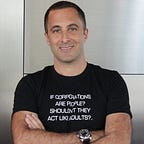Opinions–‘Like Assholes,’ Except in Economics
Despite an opinion on everything, most people avoid armchair economics.
It’s been said that “Opinions are like assholes, everybody’s got one…” and in these divisive times it seems more true than ever. Next week’s Super Bowl aside, the role of “armchair quarterback” is a popular one in nearly every matter of society these days. From sporting events and family matters to presidential impeachments and political assignations, everyone feels confidently able to render their own (or borrowed) opinion, regardless of how well they may actually understand the issue’s complexity.
This is a good thing, albeit often messy. This is how discourse happens in a free society and why facts and sources are so fundamentally important to a functioning democratic republic. But this, by design, is not the case in the field of economics, where for over 50 years the field has constructed a veil of complexity to hide severe shortcomings from the general public.
Why do we feel comfortable holding an opinion on global affairs or how an NFL team should have played a game, while likely not having a degree in international affairs or ever having played on a professional sports team? Yet at the same time when I’ve asked people about economics they often simply respond that “they’re not an economist” while perhaps self-identifying with the equivalent of a team– liberal or conservative, socialist or capitalist, etc.
This should make no sense. Unless you understand that it is by design. That begining in the 1960s the field of economics, in an effort to disguise itself as a hard science, has hidden behind complex formulas and prestigious awards. Formulas where, “Economists prefer to be precisely wrong than approximately right,” describes economic historian Lord Robert Skidelsky in an online lecture series by the Institute for New Economic Thinking (INET).
Most people have been conditioned to believe they do not have an appropriate background. This lack of confidence specifically stems from the economic education they have received. From elementary school trough college nearly every student experiences some formal and unpleasant education in economics. Academic economists present an iconic supply and demand chart, writes The Economists’ Hour author, Binyamin Appelbaum, that “shows a pair of curved lines that cross in an X on a field devoid of history or context,” as if they were fixed in space by the laws of physics. Only a select few students venture beyond these early lessons to learn the complex formulas that are often based on wild assumptions, while the majority leave feeling defeated by a field too difficult for them to comprehend.
But economics is not physics. Economics is an observation of human nature and how societies allocate resources. It is ever-changing and evolving as society and people evolve through cultural and technological change.
Economics has become a restriction on human potential instead of an observation of our actions. It is stale and focused on only what is easily measured instead of what can be created. It misplaces priorities and ignores nearly all social value.
It counts Wikipedia a market failure and high priced insulin a market success because it lacks a measurement of social wellbeing. It places human productivity in direct competition with automation instead of seeing human creativity as inherently valuable.
It is time that all of us take the field to task. That we tear down the facade and ask big questions.
- Why is parenting less valuable than working?
- Why is it ‘public prostitution’ to be a professional artist?
- How do we fight the ‘wolves’ of Wall Street?
- How is Sweden responsible for economic inequality?
- Why do cities spend so much to recruit talent?
These and many other questions can and must be addressed. What are some of the assumptions you’ve had about economics?
Economics is a field in crisis that needs new ideas So get in that chair!
Thanks for reading! If you enjoyed it, please give me a “clap” below and share this to let others know. Your love is appreciated!
